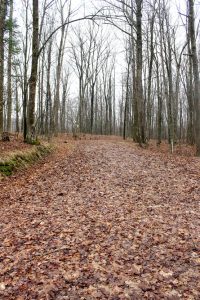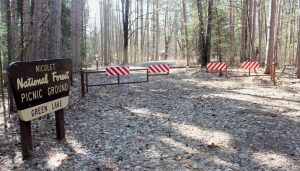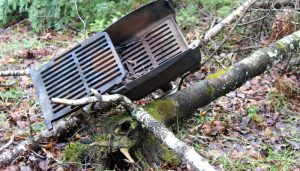Sites shut down in 2015 to cut costs
By Greg Seubert
There was a time not too long ago when a family could pack up the tent, trailer or RV and head to a national forest campground for a relaxing getaway.
That’s still possible, but the number of options are limited.
The Chequamegon-Nicolet National Forest closed 11 of its northern Wisconsin campgrounds in 2015 to cut costs and nine of them remain closed this year.
Besides the closed campgrounds, several recreation areas, day use areas, boat landings and dispersed camping sites now have reduced services that also took effect in 2015.

“Basically, what the rec folks did is take a look at all the different recreational opportunities out there, not just the (U.S.) Forest Service, but also county, state, towns,” C-NNF public information officer Greyling Brandt said. “What other resources are out there that the public has? If this site wasn’t one of the most popular but did have a high maintenance bill, it was one of those that we looked at.”
Campgrounds closed in 2015 include Stockfarm Bridge, Lake Three and Mineral Lake in Ashland County; Horseshoe Lake in Washburn County; Sevenmile Lake, Brule River and Windsor Dam in Forest County; Kathryn Lake and North Twin Lake in Taylor County; Smith Rapids in Price County; and Laurel Lake in Oneida County.
Horseshoe Lake and Laurel Lake are open this year, but the others remain closed.
“The changes this year are necessary to balance our budget given our increasing operational costs and decreasing number of visitors during the last few years,” forest supervisor Paul Strong said in announcing the closures two years ago. “The forest has continued to maintain service at normal levels despite financial challenges during the last several years, but this practice is no longer sustainable and we regret this change.”
Fast-forward to 2017.
“Not much has really changed with our closures over the last couple years,” Brandt said. “We’ve tweaked them a little bit after public feedback and we’ve opened a few little sites here and there.
“Currently, we’re going through the RSA process – a rec site analysis – where we’re taking a more in-depth look at what recreation opportunities they have,” he said. “What other uses could we do at that site? We’ve been working on that for a little over a year now and should be going out for public review in the next few months. A lot of decisions are going to be coming out in our analysis, which will basically be our long-term program of work for the next five-plus years.”

Still vacant
The Forest Service operated small campgrounds on Kathryn and North Twin lakes for several years. Kathryn Lake’s campground, about 20 miles northwest of Medford, had eight sites, while North Twin, also about 20 miles from Medford, had six.
Both campgrounds have adjacent boat landings, which are still open to the public.
“If that’s primarily the public’s access to the lake, we’d want that open,” Brandt said. “The campground, where we can provide a similar opportunity, wasn’t as high a priority to keep open. Not everything was a closure, but we did cut back on a few of the amenities at some sites.”
The forest still operates Chippewa Campground, a 78-unit campground about 10 miles from Kathryn Lake on the Chequamegon Waters Flowage. It also opens four campgrounds on the Mondeaux Flowage, a few miles north of North Twin Lake. Those campgrounds range from the four-site Picnic Point to 27-site Spearhead Point.
Other closed campgrounds have C-NNF campgrounds nearby. Lake Three and Mineral Lake campgrounds, near Mellen, are close to Beaver Lake, East Twin Lake and Day Lake campgrounds, while Brule River and Windsor Dam campgrounds are close to Stevens Lake Campground.
“We looked at the impact to the public,” Brandt said. “We had sites that offered the same value, the same type of experience. Was it really advantageous for us to maintain everything when we can provide the same opportunity just up the road?”
Medford Area Chamber of Commerce Executive Director Susan Emmerich said her office hasn’t receive any feedback about Kathryn Lake and North Twin Lake, the two closed campgrounds in her area.
“I think anytime that these campgrounds close, it’s going to have an effect,” she said. “We have other options for people and hopefully, they’re going there instead.”
Campgrounds such as Kathryn Lake and North Twin Lake weren’t used as much as other campgrounds, according to Brandt.
“That was part of it, the return on the investment wasn’t quite there,” he said. “They weren’t highly utilized sites.”

Off-limits to public
Primitive camping is allowed in the forest, but not at the closed campgrounds.
Locked gates and signs are in place on roads leading to the campgrounds and Brandt said the properties are off-limits to the public.
“You can camp just about anywhere in a national forest as long as it’s not posted as ‘no camping,’” he said. “(The shut-down campgrounds) are closed areas and there is an official closure order on them. Historically, we’ve managed those sites, so we did mitigate the hazards associated with them. Since they’ve been closed, we haven’t mitigated those hazards. It would be an unsafe environment if people still wanted to camp where that developed site was or use those features. There may be a hazard tree or something that’s there.”
What the Forest Service will do with the properties remains to be seen, according to Brandt.
“That’s part of the RSA process, to look at the future of those sites,” he said. “We don’t really sell property, we trade property. The likelihood of us selling these off, at least it’s not on the radar right now. The rec site analysis will determine what those sites will be. It’s not like they’re just going to be sitting out there with no maintenance.
“We will decide what to do with them in the short-term, I would say tentatively this year,” he said. “It’s pretty widely accepted now that the short-term solution for these are the closures or the reduced services and we’re working on an analysis to determine the long-term situation.”
Other closures
Other closed sites include Sailor Lake Picnic Area in Price County and Green Lake Beach in Oconto County. Boat landings on both bodies of water are still open. Sailor Lake Campground remains open, while Green Lake Beach is about two miles from another national forest campground, Bagley Rapids.
Facilities with reduced services include Day Lake Campground in Ashland County; Kentuck Lake Campground in Vilas County; Bladder Lake, Lake Owen and Long Lake day use areas, Valhalla Recreation Area and Drummond Ski Trailhead in Bayfield County; boat landings at Roberts Lake in Forest County, Halsey Lake in Florence County, Nine Mile Lake in Vilas County, Eagle Creek in Oneida County and Rose Lake in Oconto County; Wheeler Lake Beach in Oconto County; and several dispersed camping sites in Bayfield, Forest and Oconto counties.
Service reductions range from closed restrooms to removal of picnic tables to closing two of six loops of campsites at one campground.
Campgrounds here to stay
Don’t expect the Forest Service to abandon the campground business.
“That’s part of our spectrum of offerings,” Brandt said. “We have different development scales because we realize people are looking for different amenities. What you saw with the closures a couple of years ago is that we have a pretty decent supply of campgrounds that offer very similar opportunities. We’ve just pared back some of the opportunities.
“We’re still offering opportunities, just at different locations,” he added. “We’re going to continue to offer the range of camping opportunities from developed to more rustic. The amount of supply that we have out there is what we need to look at. Do we really need everything that we have or can we meet the public’s demand for these resources with having just a smaller amount?”
A handful of national forest campgrounds, such as Oconto County’s Boulder Lake Campground and Vilas County’s Franklin Lake Campground, remain popular, especially on holidays and weekends.
Boulder Lake, about an hour from Green Bay and the Fox Cities, includes 89 sites, while Franklin Lake, about 15 miles southeast of Eagle River, is on the National Register of Historic Places and includes historic stone and log structures built by the Civilian Conservation Corps.
“I’d say (the number of campers) has stayed pretty static,” Brandt said. “With the economic downturn in 2008 or 2009, we did see a pretty sharp dropoff there, but we’re starting to rebound. The last couple of years, we’ve had some good weather and we’ve seen some pretty good numbers.”
Online reservations at some campgrounds have helped bring those numbers up.
“That has actually brought in newer folks to those sites,” Brandt said. “Unless you’re familiar with the Chequamegon-Nicolet, you don’t know the camping opportunities. Now that we have these sites out on the Internet, people are starting to pick up on them. Some of our districts, especially on the Chequamegon side, have been on the reservation system for a while. Lakewood-Laona, over the last couple of years, has put five of their eight (campgrounds) on there. Starting this year, Eagle River-Florence put a few of theirs on there.”
Some campers like the idea of reserving a site, while others prefer first-come, first-serve.
“There’s a mix of both,” Brandt said. “When Lakewood-Laona started doing reservations a couple years ago, it was new there and that’s one of the busier districts. There was a negative perception by the public that first-come, first-serve is going out the window, but since that’s been initiated, we’ve heard a lot of positive feedback.”
Sites at participating campgrounds can be reserved at www.recreation.gov or by calling Reserve America at 877-444-6777.
“Now, you don’t have to show up at 6 a.m. the Wednesday before a holiday weekend to get the site you wanted,” Brandt said. “You can go online and you have six months before you show up that you can make a reservation. We’re actually seeing a pretty good shift toward people making reservations.”
Campsites in campgrounds cost as little as $12 per night, but that could change soon.
“We’re very affordable, but we are looking at increasing our fees, possibly within the next year,” Brandt said. “On average, we’re only looking at looking at increasing our fees by about $3, so a $12 site would be $15. That’s still very reasonable compared to other opportunities.”
The Forest Service also requires fees at several other facilities. Daily and annual passes cost $5 and $20, respectively.
